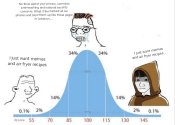Yes but there's a reason for that; the latter has a proven track record of sexual violence against women.
lol - Isn't this @Maikeru ?

Yes but there's a reason for that; the latter has a proven track record of sexual violence against women.

The absolute state of Chinese libs right now:
View attachment 143618

This time it's slightly different. For the first time in 70 years, a revolutionary vanguard has formed organically in the West.Not exactly how I would feel about it.
This stuff I have forgotten, because it is historical fact. You know, ancient history.
The West, aka white people, have always been fascinated by China.
Every time they are kicked out of China, for whatever reasons, they always come back.
Back like in the Qing dynasty, there were massacres of white people by the Chinese, forget now, and the white people left China, but they came back.
Then when the communist won the revolution the white people ran too, but they came back.
Then when the Cultural Revolution happened, white people were running again they did not want to be arrested for being a spy because they were white that means they had to be a spy, the white people left, but they came back.
Then when the 6.4 incident happened, everyone who was white basically left the country, but they came back.
Now, did this phenomenon happen again? You betcha, it was the covid lockdowns and all the white people left, but they came back.
That is the historical pattern. China opens up and closes down for white people, they come and then run away then come back again.
In view of that historical cyclical context, that apps are now another vehicle to assess China for white people, it does not seem like much of a jump, in principle does not seem much different from the past. Those scope and scale is larger now with the apps. We see how it goes.
FRANKFURT/BERLIN, Jan 16 (Reuters) - Chinese officials and automakers are eyeing German factories slated for closure and are particularly interested in Volkswagen's sites (VOWG_p.DE), a person with knowledge of Chinese government thinking told Reuters.
Buying a factory would allow China to build influence in Germany's prized auto industry, home to some of the oldest and most prestigious car brands, the person said.
Chinese companies have invested across a range of industries in Europe's biggest economy, from telecommunications to robotics, but have yet to set up traditional car manufacturing there despite Mercedes-Benz having two large Chinese shareholders.
Any such move could mark China's most politically sensitive investment yet. VW has long been a symbol of Germany's industrial prowess, now threatened by a global economic slowdown hitting demand and creaking transition to green technologies.
Building cars in Germany for sale in Europe would allow China's EV makers to avoid paying EU tariffs on electric cars imported from China and could pose a further threat to European manufacturers' competitiveness.
VW executives wanted to close several plants but faced resistance from unions. In a deal struck before Christmas they agreed to end production in Dresden, a 340-worker plant making the electric ID.3, from 2025, and Osnabrueck, where 2,300 employees produce the T-Roc Cabrio, from 2027.
VW would be open to selling the Osnabrueck factory to a Chinese buyer, a person familiar with the company's thinking told Reuters.
"We are committed to finding a continued use for the site. The goal must be a viable solution that takes into account the interests of the company and employees," a spokesperson said, declining to comment specifically on speculation about an offer.
Chinese companies are concerned about how they would be received by German unions, which hold half the seats on German companies' advisory boards and seek far-reaching site and job guarantees, the person familiar with China's thinking said.
Stephan Soldanski, a union representative from Osnabrueck, said workers at the plant would have nothing against producing for one of Volkswagen's China-based joint venture partners.
"I could imagine that we would produce something for a China joint venture .... but under the VW logo and under VW standards. That is the key condition," he said.
You can say that he is ahead of his time.Maik, so you defected?
